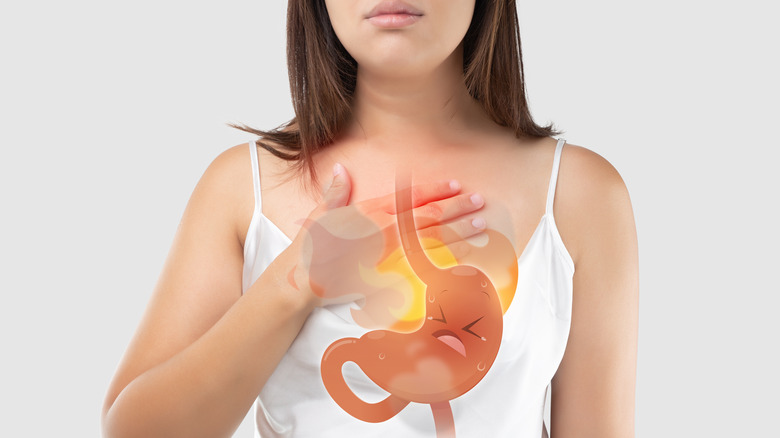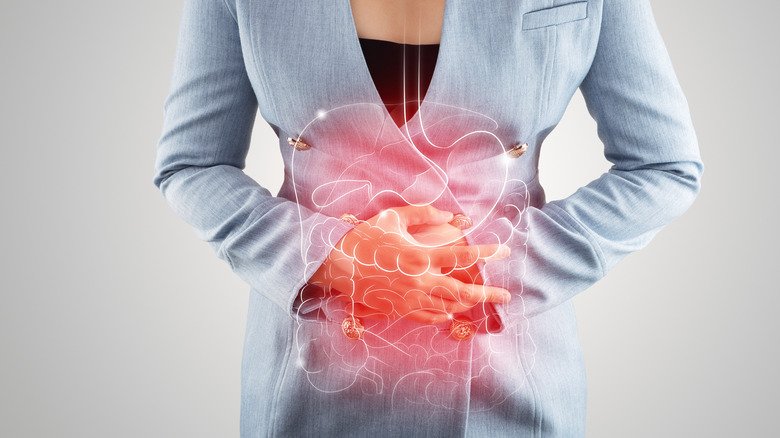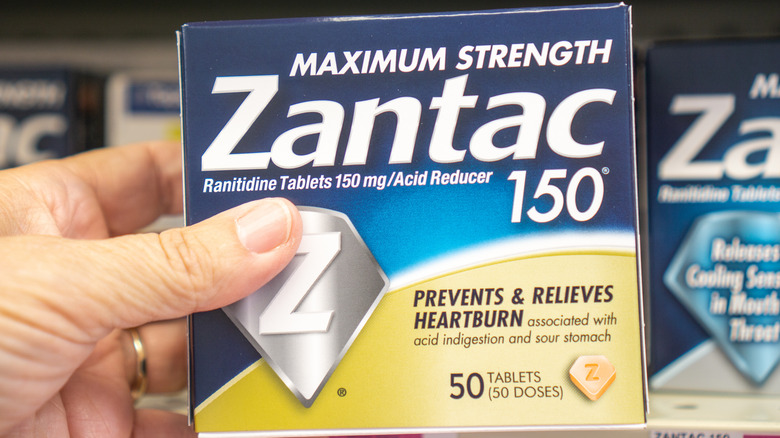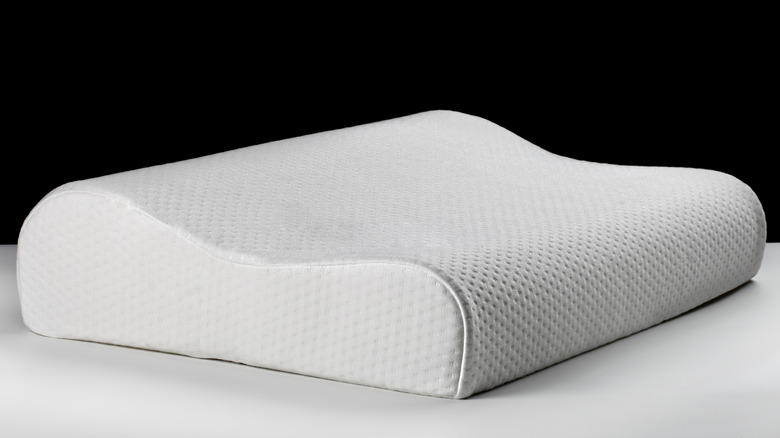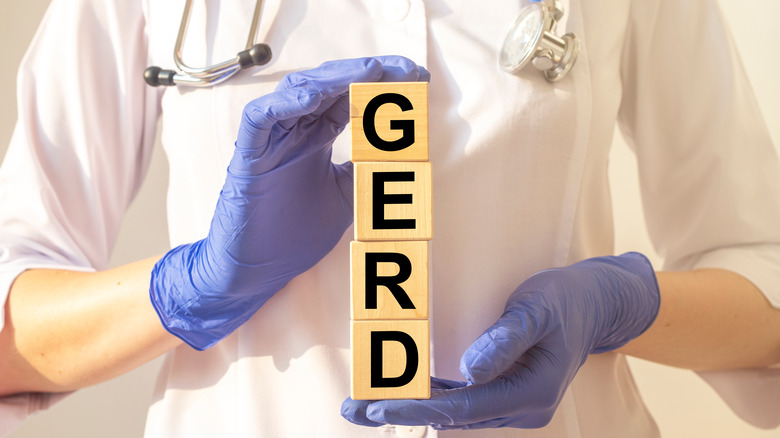Acid Reflux Explained: Causes, Symptoms, And Treatments
The esophagus or "gullet" — sometimes called the "food pipe" by doctors — is not a very glamorous organ. It connects your oral cavity to your stomach, and it's mostly known for transporting food from your mouth to your stomach and, unfortunately, acid reflux.
We don't want to pick on a body part that's doing a thankless job every day, bereft of glory or fame. But esophagus, you have one job: watch the door. Like a reverse-bouncer, the esophagus lets everybody into the dance party that is the stomach, then slams shut to keep anyone from leaving. If that door isn't closed tightly enough, a busy stomach might slosh digestive juices back up into the esophagus. This is what is known as acid reflux, a painful experience in the moment and possibly a health threat if it goes unchecked (via the American Gastroenterological Association).
That being said, we don't want to entirely blame the esophagus. Let's take a closer look at acid reflux, learn why it happens, and see what we can do to relieve it.
What exactly is acid reflux?
In a perfect world, digestion is a one-way trip. The bottom end of your esophagus — the tube connecting the oral cavity to the stomach — has a valve that shuts tight to keep your stomach contents where they belong. Sometimes, this muscular valve, or the lower esophageal sphincter, becomes weak and doesn't completely close. That is what allows the contents in your stomach to come back up, or reflux, into the esophagus. Muscle weakness can be the result of obesity, pregnancy, certain medications, alcohol or tobacco use, aging, or other factors.
If stomach acids are in the mix, acid reflux can cause a painful, burning sensation felt in the chest or neck. This is called heartburn, but it doesn't actually involve the heart — it's the tissues of the esophagus being touched by stomach acid. Occasional heartburn is pretty common, as eating too fast or too much can cause it. When heartburn occurs on a regular basis, however, it can become a full-blown medical condition called gastroesophageal reflux disease (GERD). Generally, GERD is a quality-of-life problem, but in some cases, prolonged GERD can lead to more serious complications. It's important to consult your doctor if your heartburn is frequent (via the American Gastroenterological Association).
Acid reflux causes symptoms beyond heartburn
While heartburn is the most common (and hardest to ignore) consequence of acid reflux, it's not the only symptom. People with recurring acid reflux might experience problems swallowing, a burning sensation in the throat, nausea, or a bad taste in their mouth. If the reflux brings stomach juices up into the windpipe or mouth, it can cause a dry cough, toothache, or a hoarse voice (via the Institute for Quality and Efficiency in Health Care).
Frequent acid reflux (gastroesophageal reflux disease, or GERD) can occur without heartburn. A 2007 study found that slightly more than half of the people who went to an emergency room for chest pain had acid reflux (Note: It's important to seek medical attention for chest pain). Additional research found that some patients with a chronic cough could benefit from surgery to treat acid reflux.
Sometimes, acid reflux manifests as a condition called "silent reflux," in which stomach acids reach the throat or voice box. Also known as laryngopharyngeal reflux (LPR), this produces hoarseness, chronic cough, swallowing and breathing problems, and the sensation of a lump in the throat doesn't go away. Heartburn is less likely, hence the "silent" designation (via WebMD).
Long-term acid reflux is a cancer risk
One reason to seek treatment for ongoing acid reflux is that in a small number of cases, it can lead to cancer of the esophagus. While this doesn't necessarily mean you'll develop cancer if you experience acid reflux, prolonged exposure to stomach acids — we're talking years — can cause a transformation in the cells that line the esophagus. This is in an attempt to protect the affected tissues from acidic assaults. The condition is called Barrett's esophagus (BE), and it's more likely to occur in people who are overweight, male, and white. A small percentage of people with BE—about 1% per year — develop esophageal cancer (via Memorial Sloan Kettering Cancer Center).
Barrett's esophagus doesn't produce symptoms, so it's usually the effects of acid reflux that raise the alarm. Someone who has risk factors, including GERD, obesity, smoking, and a family history of BE, may be recommended by their doctor to undergo an endoscopy. This procedure involves a tube being placed down the throat to take a look at the gastrointestinal tract. That, and a biopsy, can determine if BE is present, and help patients and their doctors decide what the next step should be (via Memorial Sloan Kettering Cancer Center).
How to relieve acid reflux
The good news about acid reflux is that there is a variety of options for putting out the fire. Broadly speaking, you have 4 lines of defense, according to Johns Hopkins Medicine.
The first move is to try lifestyle changes, and the most impactful of those is to lose weight if you're overweight. Research has found that the incidence of acid reflux increases as obesity rates go up (via ABC News). Other measures that can help include changing your diet, avoiding alcohol, and not smoking.
Beyond that, a number of over-the-counter medications are available. For occasional reflux symptoms, antacids can provide quick relief. Over the long-term, however, they may make the situation worse as your stomach increases its acid production. Antacids can also have side effects if overused, like diarrhea or kidney problems, according to the Mayo Clinic. Other OTC options can decrease acid production, giving a damaged esophagus time to heal.
Should those methods prove ineffective, a number of prescription and surgical alternatives are available. This includes prescription-strength versions of the OTC meds, and minimally invasive surgeries to tighten the muscle that closes the esophagus. One method, called transoral incisionless fundoplication (TIF), is done with a device inserted through the mouth, and no incision is needed (via the Mayo Clinic).
There are DIY treatments for acid reflux
If you have an acid reflux problem, making changes to your diet should be your first defensive play, according to Johns Hopkins Medicine. The good news there is that you have lots of options.
A number of foods are known to worsen acid reflux symptoms. Common offenders include fried and fatty foods; chili pepper; fatty meats like sausage and bacon; cheese; tomato and citrus fruits; chocolate; peppermint; and carbonated beverages. However, foods that trigger heartburn can differ from one person to the next (via Harvard Medical School). Keeping a diary of what you eat can help you figure out your particular triggers. It also helps to break up your meals into smaller portions throughout the day to keep your stomach from getting too full.
Likewise, there are foods that seem to put out the fire. High-fiber foods help you feel full, so you're less prone to over-eat and produce extra stomach acid. Some foods can reduce acidity, including bananas, melons, cauliflower, fennel, and nuts. Foods with lots of water, like watermelon, lettuce, celery, and cucumber, can dilute stomach acids. Ginger tea is also alkaline in nature and anti-inflammatory (via Johns Hopkins Medicine).
A 2017 study found that people who followed a plant-based, Mediterranean-style diet reduced their reflux symptoms as much as a group who took medication.
Magnetism may help
If acid reflux symptoms don't respond well to lifestyle changes or drug therapy, one treatment option is to harness one of the fundamental forces of the universe: magnetism. You'll recall that a weak muscle, or sphincter, that doesn't close tightly enough allows stomach acids to back up into the esophagus, causing heartburn and other symptoms. Surgeons can correct this problem by wrapping a band of tiny magnetic beads called a LINX device around the lower esophagus, kind of like a bracelet for your digestive tract. The magnetic attraction between beads is weak enough that the band will open to allow food to pass through to the stomach, but strong enough that it will tighten, keeping the esophagus closed and stomach acid out (via the Mayo Clinic).
The device was approved by the U.S. Food and Drug Administration in 2012. One clinical trial found that 90% of patients were exposed to less stomach acid after the procedure, and 93% reported their reflux symptoms decreased by 50% or more over 2 years. About 92% were able to stop taking medication (via Stony Brook University Hospital).
Acid reflux can be a sleep thief
Sometimes, acid reflux can keep you up at night. It can do so without causing heartburn, which means you may not realize what's disrupting your sleep. In one study that examined 81 people with sleep problems, 26% had acid reflux. Among those with acid reflux, their sleep was interrupted as a result of 94% of recorded reflux events. "These are patients without significant heartburn symptoms, who are experiencing acid reflux during sleep," said William C. Orr of the Lynn Health Science Institute. He added that this kind of asymptomatic reflux could be the reason when there's no obvious cause of a sleep disorder.
In other research, acid reflux was linked to sleep apnea, a condition in which breathing is partly or completely obstructed during sleep, causing disrupted sleep (via the American Academy of Sleep Medicine). A study of 168 people with sleep apnea symptoms found that daytime and nighttime heartburn was common (via the American College of Gastroenterology). People who reported moderate-to-severe nighttime heartburn cited worse quality of life than people who had sleep apnea without it. A 2016 study found that treating sleep apnea reduced nighttime heartburn symptoms.
Acid reflux can feel like a heart attack
Though it doesn't involve your heart, the burning sensation of heartburn — a common symptom of acid reflux — can feel like a cardiac event. Anatomically speaking, the esophagus and the heart are next-door neighbors, so chest pain can be caused by either scenario. Sometimes, it's impossible to discern heartburn from a heart attack, though the latter tends to include sweating, shortness of breath, and chest pain. The former should subside if you take an over-the-counter remedy, such as an antacid. It's better to be safe than sorry, however, and have a doctor (or the ER) evaluate unexplained chest pain, according to the Cleveland Clinic.
In fact, a heart attack can happen without chest pain. Subtler symptoms include pain in the arms, neck, or jaw; sweating; unusual fatigue; nausea or vomiting; feeling lightheaded or dizzy, extreme weakness, and anxiety. Indigestion, choking, or feeling full — which are also symptoms of heartburn — can accompany a heart attack. Women and people with diabetes are more likely to have subtle heart attack symptoms.
It's time to call 911 if you have chest pressure, tightness, or discomfort that you haven't had before, especially if accompanied by any of the aforementioned symptoms (via the Cleveland Clinic).
Asthma and reflux seem connected
If you have asthma, it raises the odds that you'll have heartburn. If you have frequent heartburn, you're more likely to have symptoms of asthma as well, according to WebMD. It's not completely clear why the two conditions often occur together. According to a 2017 academic review of the subject, research into the nature of the connection has been inconsistent, partly because the definition of acid reflux disease can vary from one study to the next.
Although the details are murky, it seems clear that acid reflux can trigger asthma symptoms or make them worse (via WebMD). This might be a result of stomach acids affecting nerves in the esophagus, causing airways to narrow. It may also be due to stomach acids finding their way into the lungs, irritating airways and making breathing more difficult. It's also known that some drugs used to treat asthma weaken the muscles of the esophagus, allowing acids to leak from the stomach. On the plus side for people with both conditions, treating acid reflux can relieve asthma symptoms.
Elevation can counteract acid reflux
If reflux is your foe, gravity is your friend. Any time your stomach is lower than your esophagus, stomach acids are less likely to stray. You're better off if you can stay standing, or at least sit up, after a meal. Try to avoid vigorous exercise after eating, which can slosh stomach contents up into the esophagus, especially if it involves bending over. Wait at least 3 hours after eating before you go to sleep — avoid late-night meals or midnight snacks.
For nighttime heartburn, it can help to sleep on a slant instead of lying flat: raise the head of your bed by putting it on risers, or use a foam wedge to keep your upper body elevated a bit, as piling up pillows generally isn't effective (via Harvard Medical School). Raising your head 6-8 inches while you sleep helps stomach acids drain, according to Health.
Chewing gum might ease acid reflux
In a pinch, one way to ease acid reflux symptoms may be to chew some gum. It's not so much the gum that helps as it is the chewing — the idea is that it increases saliva production, which helps wash stomach acids out of the esophagus. In a study published in the journal Digestion, 10 volunteers chewed gum, which doubled their flow of saliva.
A 2008 study published in the Alimentary Pharmacology and Therapeutics journal found that chewing gum for an hour after a meal reduced the amount of acid in the esophagus, an effect that lasted for up to 3 hours. Additionally, a 2020 study suggested that tablets taken to increase saliva production have been found to reduce heartburn symptoms in patients with chronic acid reflux.
If you rely on this remedy, favor sugar-free gum, as gum with sugar can damage your teeth and set you up for cavities (via Healthline). Be wary of gum that contains mint, as peppermint is believed to relax the esophagus, promoting acid reflux.
Babies get reflux as well
You probably know that babies spit up, but you may not know that this is an example of acid reflux. The muscle at the lower end of the esophagus isn't fully mature in infants, which means it doesn't close tightly enough to keep stomach contents from coming back up. Combined with the fact that they spend so much time lying down and their diet is mostly liquid, the phenomenon is all the more likely. It can happen multiple times a day, but it's completely normal and usually resolves itself by 18 months or so. It can be reduced by feeding the baby in an upright position and holding them in a sitting position for 30 minutes after. You can also feed them smaller, more frequent meals, and burp them during and after feeding.
It's usual for infant reflux to become a problem since their wee stomachs don't generate enough acid to cause trouble. Signs that something may be wrong include lack of weight gain, forceful vomiting, spitting up blood or green or yellow fluid, breathing problems, chronic cough, or irritability after eating (via the Mayo Clinic).
Acid reflux is common during pregnancy
A few factors make heartburn, the painful consequence of acid reflux, common among pregnant women. For one thing, hormonal changes slow down the digestive system, which means there's more opportunity for stomach acids to reflux into the esophagus. Pressure on the stomach by the expanding uterus can push those acids upward. Acid reflux can start at any time during pregnancy and tends to get worse as it progresses, but usually improves after the baby is born.
Common anti-reflux lifestyle changes can help moms-to-be: eat small, frequent meals instead of a few large ones; avoid lying down after eating; avoid spicy or acidic foods, and any food that seems to trigger heartburn; sleep with the head of your bed elevated, or use a foam wedge (via the University of Michigan Health).
Pregnant women should avoid antacids that contain aluminum, aspirin (salicylate or acetylsalicylic acid), sodium bicarbonate, or sodium citrate, according to Parents. Don't take calcium-containing antacids at the same time as prenatal vitamins, and talk to your doctor before trying any heartburn remedy.
Do you have GERD?
If you've felt the fiery fingers of heartburn singeing your chest, how do you know if it's serious? One rule of flame: if you have heartburn 2 or more times a week, or the symptoms persist despite taking medicine, it's a good idea to see your doctor about it (via the American College of Gastroenterology).
The ACG has also developed a self-test to assess if you may have gastroesophageal reflux disease, a chronic health problem caused by acid reflux. To paraphrase, you may have it if any 2 of the following statements are true: You have symptoms, such as discomfort, behind the breastbone, burning in the back of your throat, or an acid taste in your mouth; symptoms occur after meals; you have heartburn or indigestion 2 or more times a week; antacids only provide temporary relief; you take prescription meds for heartburn, but still have symptoms.
If 2 or more of those statements apply to you, it's time to talk about GERD with your doctor. See the full self-test here.

